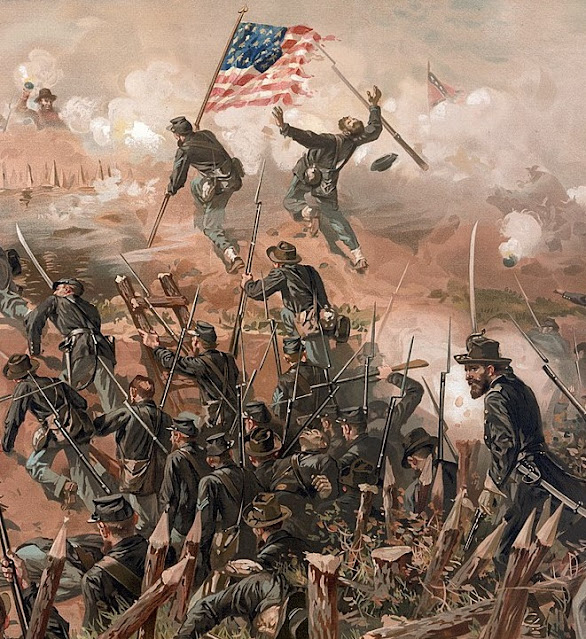This Hard Life Has Told Heavily on the Men: Victory at Vicksburg
After more than 40 days of siege, Adjutant Henry O. Dwight and his comrades in the 20th Ohio had become hardened veterans, but it came at a cost.
"
Adjutant Dwight’s account of the final days of the siege of Vicksburg originally appeared in the July 31, 1863, edition of the Southbridge Journal published in Southbridge, Massachusetts where Dwight had relatives.
Near Vicksburg, Mississippi
July 2, 1863
I suppose it
may appear strange to you that I should be anywhere else than at Vicksburg at
this time, but our duty is no less important than digging into the besieged
city: it is keeping the rear clear. We are snugly fortified and are ready for
Mr. Joe Johnston who, like a scarecrow, is continually before the eyes of the
North to educe faith in Grant’s final success.
It is very
natural to wish to impart to me some of the luxuries that you speak of, but I
am afraid that I could not appreciate them just now. I am entirely weaned from
any longings after houses for shelter, soft beds, or good things to eat- from
everything but home society. A cup of coffee, a cracker, and a piece of salt
pork cooked or raw as circumstances may require have made me many a welcome
meal and have wiped out all yearnings for little niceties to eat such as I
would have at home. The only luxury to me would be to get into camp once more and
fix up a few camp luxuries. Since the 19th of April, we have had no
camp, no tents, and for more than a week, no chance to clean up and look
decent. This hard life has told heavily on our men: nearly 200 have been left
sick in different hospitals and besides that, we have lost 119 killed and wounded
in the past two months so that we have but 350 men with us now.
As I write,
they are banging away at Vicksburg very briskly. Yesterday they exploded
another mine, blowing up a large slice from out of Fort Hill, the Rebel
stronghold in front of us. An unfortunate Negro standing with some Rebels
inside was blown up and took a free passage to our lines where he alighted
square on his head in a basket of earth. His head saved him as it was so thick,
he was not hurt. The say the siege will not last much longer and after the 4th
the Rebels will give up. I hope it is so for though it is very romantic to live
a soldier’s life in the field, there is such a thing as too much of a good
thing.
Near Vicksburg, Mississippi
July 6, 1863
And so the
victory is ours at last. On the morning of the 4th, I saddled my
pony and made a triumphant entry into the city of Vicksburg. At 9 o’clock, the
Rebels all came out in line of battle, stacked arms outside the fortifications
and marched back to quarters, prisoners of war. And then it was that shouts
such as were never heard before made the welkin ring for 15 miles around. First
the troops in the trenches gave the cheer then the reserves took it up and almost
as soon as the frenzy of joy reached the army of the Black River until the
cheers rent the air on every side, dying out in the distance only to be renewed
with more vigor.
At 10 o’clock, Logan’s division entered the city with flying colors and joyous music. At the same time, the fleet, decked in flags, pealed forth a grand salute to the Union. In our brigade, every man was growling because we had to remain at our post and miss the honor given to our division of being the first to enter Vicksburg. But the Rebels were threatening our lines from the east and we could not leave.
It has never
before been my fortune to see a large force on the march. We have always
hitherto been in the advance. For two days, however, the troops have been
constantly passing on their way to Johnston, that is, if Johnston is willing to
wait for them and get another whipping. It is a fine sight to see them moving.
Vicksburg is a miserable little town whose only ornament is a courthouse and
that even is torn by sundry shots and pieces of shells. Every hill side is scooped
out in little caves, dug by the people to escape our shots. In several camps I
saw the mules that had been killed for their Fourth of July dinner and which
would have been eaten had it not been for the surrender. As it was, they dined
off Uncle Sam’s crackers and bacon. Most of the prisoners were entirely
disheartened and glad to surrender.
Source:
Letter from Adjutant Henry O. Dwight, 20th Ohio
Volunteer Infantry, Southbridge Journal (Massachusetts), July 31, 1863,
pg. 1












Comments
Post a Comment